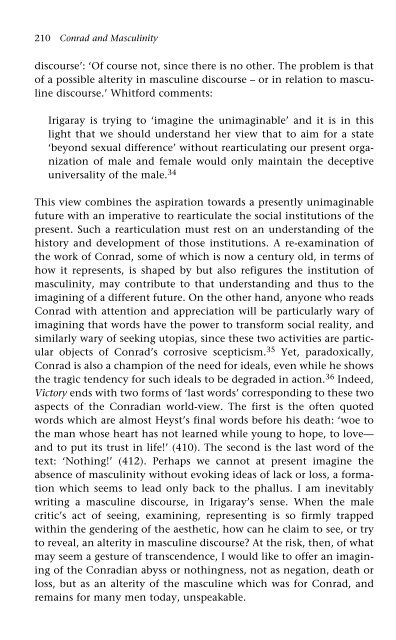Conrad and Masculinity
Conrad and Masculinity
Conrad and Masculinity
Create successful ePaper yourself
Turn your PDF publications into a flip-book with our unique Google optimized e-Paper software.
210 <strong>Conrad</strong> <strong>and</strong> <strong>Masculinity</strong><br />
discourse’: ‘Of course not, since there is no other. The problem is that<br />
of a possible alterity in masculine discourse – or in relation to masculine<br />
discourse.’ Whitford comments:<br />
Irigaray is trying to ‘imagine the unimaginable’ <strong>and</strong> it is in this<br />
light that we should underst<strong>and</strong> her view that to aim for a state<br />
‘beyond sexual difference’ without rearticulating our present organization<br />
of male <strong>and</strong> female would only maintain the deceptive<br />
universality of the male. 34<br />
This view combines the aspiration towards a presently unimaginable<br />
future with an imperative to rearticulate the social institutions of the<br />
present. Such a rearticulation must rest on an underst<strong>and</strong>ing of the<br />
history <strong>and</strong> development of those institutions. A re-examination of<br />
the work of <strong>Conrad</strong>, some of which is now a century old, in terms of<br />
how it represents, is shaped by but also refigures the institution of<br />
masculinity, may contribute to that underst<strong>and</strong>ing <strong>and</strong> thus to the<br />
imagining of a different future. On the other h<strong>and</strong>, anyone who reads<br />
<strong>Conrad</strong> with attention <strong>and</strong> appreciation will be particularly wary of<br />
imagining that words have the power to transform social reality, <strong>and</strong><br />
similarly wary of seeking utopias, since these two activities are particular<br />
objects of <strong>Conrad</strong>’s corrosive scepticism. 35 Yet, paradoxically,<br />
<strong>Conrad</strong> is also a champion of the need for ideals, even while he shows<br />
the tragic tendency for such ideals to be degraded in action. 36 Indeed,<br />
Victory ends with two forms of ‘last words’ corresponding to these two<br />
aspects of the <strong>Conrad</strong>ian world-view. The first is the often quoted<br />
words which are almost Heyst’s final words before his death: ‘woe to<br />
the man whose heart has not learned while young to hope, to love—<br />
<strong>and</strong> to put its trust in life!’ (410). The second is the last word of the<br />
text: ‘Nothing!’ (412). Perhaps we cannot at present imagine the<br />
absence of masculinity without evoking ideas of lack or loss, a formation<br />
which seems to lead only back to the phallus. I am inevitably<br />
writing a masculine discourse, in Irigaray’s sense. When the male<br />
critic’s act of seeing, examining, representing is so firmly trapped<br />
within the gendering of the aesthetic, how can he claim to see, or try<br />
to reveal, an alterity in masculine discourse? At the risk, then, of what<br />
may seem a gesture of transcendence, I would like to offer an imagining<br />
of the <strong>Conrad</strong>ian abyss or nothingness, not as negation, death or<br />
loss, but as an alterity of the masculine which was for <strong>Conrad</strong>, <strong>and</strong><br />
remains for many men today, unspeakable.




